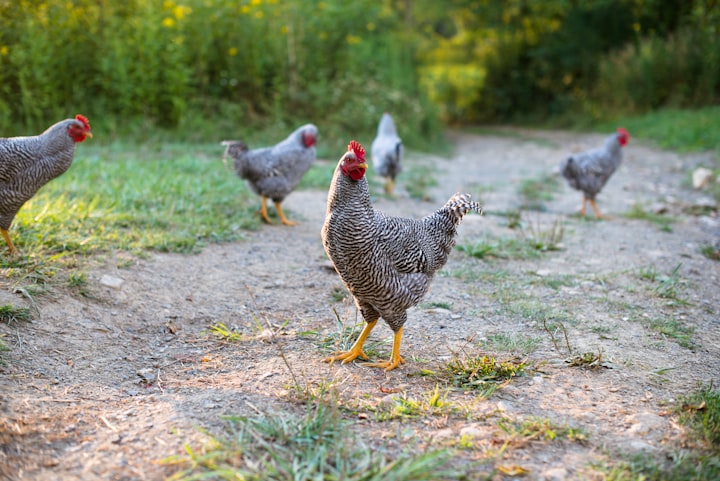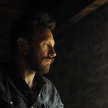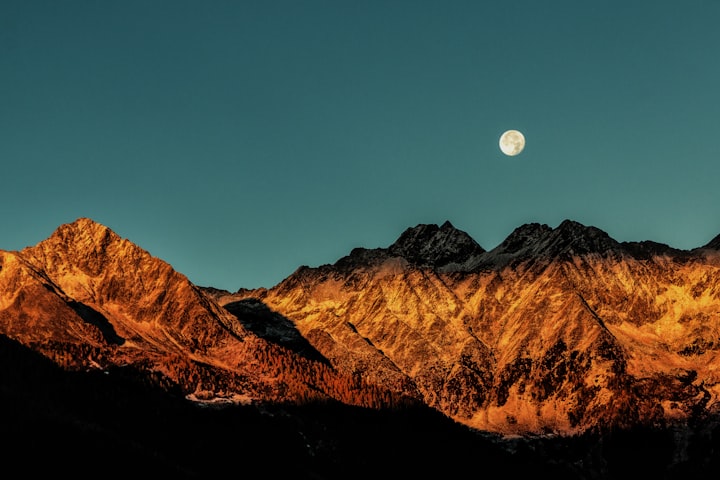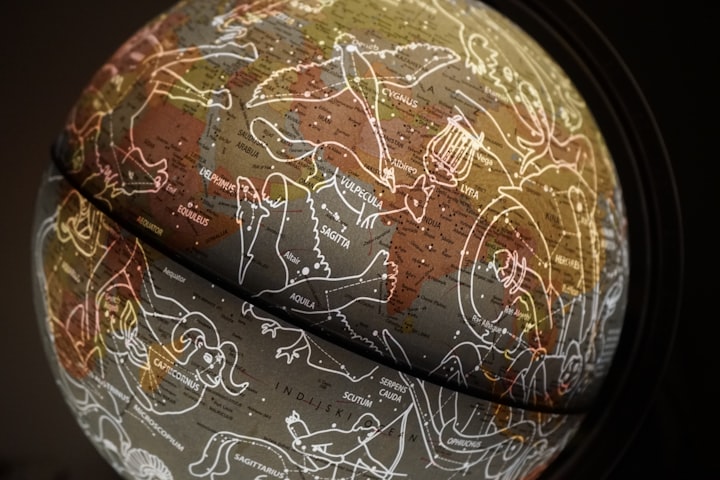Putting Down Roots in Dystopia
Chapter 1 - In which we meet the family, living in curious circumstances

Fiona holds the hen tenderly in her small arms. The bird is calm with her, its golden eye regarding me impassively.
"Fluffers is acting kinda funny, Papa. You think she's egg-bound?"
She cradles the hen close to her, making quiet, calming sounds beside its head, as if it were a baby. While she holds it, I lay a hand across its back and feel gently under its belly, behind the legs, below the tail feathers. I've grown familiar with the physiology of chickens.
"I don't feel anything, but let's keep an eye on her. Maybe there's something else going on that will show up in the next few days."
Fiona nods and returns the chicken to the pen, where the animal ruffles its feathers once, twice, then trots off to rejoin the others.
The children still give the birds names, even though they are not always destined for a long a noble life of egg-laying. Chickens have at least two purposes around here, but the children still can't help but name each one when it is still a baby ball of fluffy chick feathers.
As we watch Fluffers rejoin the flock, I become aware of a hint of a distant noise–a steady, low rumble, something that used to be familiar.
I turn my head to try to measure the direction, gauge the distance. The sound gets steadily louder, though I can tell it is still quite far off. As I listen, I look at Fiona, and I see that she hears it, too. She watches me watching her as we listen together. The sound changes direction, then, and moves away, growing ever fainter, until it is lost behind the familiar sound of the breeze in the trees and the hum of insects.
"A car," Fiona says quietly.
"Yeah."
"Where d'you think they're going?" she says. Her eyes are full of questions.
"I don't know. Not this way, I guess."
We continue to look at each other. I try to read her expression, as I'm sure she is trying to read mine.
What did she see there? Expectation? Or is it fear?
The chickens were a relatively straightforward project. We'd begun to keep a small flock when the girls were little, and when we moved to a more rural location, it was natural to let the flock grow. The original intention was eggs; chickens lay them, and we eat them. Their second purpose didn't come around until later on.
The kids still help take care of the flock. Indeed, they've really risen to the occasion with a tenderness and vigor I could never muster for the birds. Maybe there's a mothering instinct to it that I just don't have.
In the beginning, when the whole thing started, it all seemed like it would be pretty painless; a tiresome nuisance that would blow over. I'd happened to have made a few trips to the local grocery stores earlier in the week, overbuying the basics out of habit. The weekend came and the kids were home from school, and we were in good shape. When Monday came, the schools just didn't open again. Messages came in from the teachers that they were working on arrangements on their end, but we should try to keep the kids busy in the meantime. Two weeks, they said, and things would probably be back to normal. Those two weeks came and went, and the girls never went back.
That second week, they started clamping down on public spaces. Entrances to the parks were closed off, and gatherings of 10 or more were prohibited. People were encouraged to keep their distance, which, for the most part, they did.
No one wanted to chance the Sickness.
Then there was a run on the grocery stores. Lots of people got spooked, and started hoarding, causing shortages of all sorts of basic items. Toilet paper, canned goods, anything non-perishable. Since we were lucky enough to have just stocked up, we didn't really worry, and the panicking masses all just looked kind of silly and desperate.
Not everywhere was the same. There were reports of massive shortages in the neighboring states, and in areas closer to the cities. But details were fuzzy, and people were really beginning to panic, so you couldn't tell what was true and what was fabrication.
After four weeks, everything was locked down. Stay-at-home orders were issued, and we were happy enough to comply. We hadn't left the house since that first week, so by then it didn't even feel that strange.
Eventually, cars stopped passing the house. Our little country lane, already comparatively quiet, became completely still. The sky overhead became totally clear, with nothing flying over at all. Traffic from the distant highways quieted, then faded out completely.
Birdsong reigned.
Certain necessary services were allowed to remain open. Grocery stores offered pickup outside for awhile, then became delivery-only. Restaurants, for a time, offered curbside pickup of takeout orders, but as people stopped leaving their homes, that eventually died out.
When our first stockpile of food began to dwindle, we arranged for a drop-off of food–mostly meat, dairy, and some fresh vegetables. The driver left our bags at the mailbox and wouldn't approach the house. She wore a bandana over her mouth and nose. Nobody wanted to risk catching the Sickness.
Each of our successive orders of groceries was more difficult to get than the one before. Many things we could ration, but not everything. In the Spring, we decided to start to let our chickens hatch out. At this rate, we'd need the chickens as much as we'd need their eggs.
We managed one last trip to a little farm market shop further out in the country west of us, where things hadn't changed so drastically. There we were able to load ourselves up on 250 pounds of flour and a carload of bulk dry goods. Beans, rice, other cereal grains. At that point we were setting up for the long haul.
Internet service, thankfully, was still functioning, though rumors flourished online that it would soon be shut down, though no one knew why, or who they'd heard it from.
News continued to reach us from out in the world about how the Sickness was spreading. New York, Chicago, Detroit, Los Angeles–all were under quarantine. Photographs circulated of empty streets and downtowns, Times Square completely desolate, its high-rise advertising staring blankly out at the vacant streets and sidewalks, remnants and relics of an age so recent but somehow already lost to time.
Seeing those pictures, it was hard to know whether there were really still people anywhere.
They were ghost towns, every one.
At the homestead, life continued. We foraged in our woods, harvesting ramps, morels, watercress from the stream, purslane along the treeline. We added wild garlic mustard to our salads, and my wife Elsie baked bread using a homemade sourdough starter that she'd cultivated from under a flowering viburnum. We began to process long-forgotten frozen cuts of meat, grinding our own sausage and hamburger.
In the earlier weeks, there had been nightly briefings, updates from the state, messages from the President. It was spreading faster than expected, they said, but steps were being taken, every possible precaution. All available resources were being directed toward stopping the spread, protecting the most vulnerable populations.
Stay home, they said. Keep your distance. Since the most dangerous carriers were asymptomatic, it could be anyone. Stay safe from community spread. Anyone could be contagious and not even know it.
Over time, the briefings stopped being televised. It simply wasn't safe. They switched to audio briefings, but the message remained unchanged: stay home, avoid contact with each other. The more contact you had, the longer we would all have to stay home.
Spring came into full bloom. Mail service became more and more irregular. We planted triple the quantity of vegetables in our garden, with an eye toward surviving the Winter. Large quantities of potatoes, turnips, parsnips–things that would keep.
It's summer now. It's hard to remember what life was like before the Sickness, and some days it's hard to remember that it is the reason why we live the way we do.
The girls' school had managed to keep up remote lessons through the rest of the Spring term, then wrapped up for the year. It's not clear whether there will be an attempt to resume school in the Fall. It's even less clear whether the girls will pick back up even if it does. There's so much to learn already around the homestead.
I leave Fiona with the chickens and head to the barn. I take two dozen eggs from the refrigerator there and wrap them in an insulated cooler bag.
I wheel my bicycle out from behind the barn, strap the eggs onto the rack over the back wheel, then nose the bike down the driveway and out along the lane. We haven't taken the car out in months, and I don't even know if it will start.
The sun dapples the road as I pedal along, the early summer breeze thick with the scent of honeysuckle.
A little more than a mile farther on and I've reached the end of our road. On the corner is a double-walled wooden box, attached to the post of the stop sign.
I place the the eggs inside and fit the lid securely back in place. Tomorrow morning there will be bottles of fresh milk waiting in place of the eggs, and maybe cheese. Later in the season, I'll send along a jar of moonshine with the eggs. Our neighbor has neither chickens nor still, and I don't have the room to keep cows. This way, we all get to stay home, keep our respective distances. None of us wants to risk catching the Sickness.
When I return to the house, Fiona has moved on and her older sister is shooting her bow in the grass on the other side of the house. I've been wondering whether she'll be ready to hunt this year. A deer or two would certainly help us through the Winter, and I wouldn't say no to smaller game, like the groundhogs who still dig their way into our garden from time to time.
Every morning when I get up I try the lights. So far the power has stayed on. We've mounted a hand pump to the top of the well head, just in case, but the electricity keeps coming, so there must be something still functioning out there. We hope there won't be a heavy storm that could knock the lines down, because we really don't know whether anyone will come to repair them. I wonder every day how much longer the grid will, or whether one day I'll try the switches and find that it's gone out.
As I cross yard to where Ava is shooting, I hear it again. Distant again, but unmistakable, and getting louder. It stops me in my tracks, and I listen. This one sounds like a truck, but I can't be certain. The sound has become so foreign, it could be a spaceship and I wouldn't be more surprised.
It grows steadily louder, until this one, too, turns off somewhere and moves away. I continue to listen, standing stock-still, until it fades away completely, drowned out by insects and birds like the one before.
I turn back toward the yard and see that Ava has stopped shooting and is watching me. The expression on her face tells me that she heard it, too, though her feelings about it are more inscrutable than her sister's.
She stands with an arrow nocked in her bowstring, the point toward the ground. Despite her penchant for more outward directed modes of expression and a far more fiery disposition than her younger sister, she is by no means insensitive to the effects of anger and violence, and in fact often tends to be more sensitive than the rest of us. She still grows faint at the sight of her own blood, which gives me tremendous pause when I consider her readiness for hunting. It seems a shame: she's such a good shot, and here we are with acres of woods filled with deer.
Her inscrutable expression slips, and the little girl she still wants to be betrays an uneasiness. She is looking at me for reassurance, but she wants to see what I'm feeling before she'll show hers.
"Did you hear that?" I say. "Sounded like a car."
We both know she did. She nods.
"Not very close, though, was it?" she says. "Where was it coming from?"
"Not sure. Hard to say." I look off in the direction we both know it was coming from. "Maybe out by the highway?"
I turn back to her. "They don't seem to have been heading this way," I say, repeating the same unsurety I gave her sister.
"How's shooting?" I ask, relaxing my clenched body and walking over to where she's standing. She accepts my invitation to change the subject.
"Okay. Not great. I keep landing to the left, but I can't seem to correct it." She begins to draw to demonstrate.
The bow was a gift from an old neighbor who used to walk his dog past the house. We haven't seen him in ages. He'd given her some pointers early on, and the rest she seems to have just worked out on her own. She hopes to start making her own arrows, just for the fun of it, fletching them with feathers from her favorite chickens.
She looses the arrow, and it lands an inch to the left of the bulls-eye on the straw bale target, just alongside the previous one. As she turns to look at me for a response, it occurs to me that I may have little to offer in support. I'd done archery in scouts and again in high school, but I'd never had what you'd call a mastery. Whatever she needs to correct is between her and that inch of target.
"See?" she says.
"Try aiming an inch to the right of where you want to hit. Maybe that'll work." It's the best I can think of, under the circumstances.
She pulls out another arrow and nocks it.
"Haven't heard a car in a while."
She's brought it back.
"You think it means things might be going back to normal?" she says.
It's the first time I've heard her call it that. Usually it's "the way they were," or "the way they used to be." Calling it normal makes me realize there's more to this for them than just keeping ourselves going.
She pauses again, arrow nocked, waiting again for my response. I consider what I think, and what I think she wants–or needs–to hear.
"I don't know, kiddo. I don't know why anyone else around here would know things were going back to normal before we did."
"Maybe because we're completely cut off from the rest of the world and we never talk to anyone but each other, ever?"
Ah, pre-teens.
"Okay, fair enough," I say, "but if things were going back to normal, that news would have to come from somewhere, and I have my doubts that somebody out here driving their pickup truck around will happen to have heard it before we do." She gives me an impatient look. "More likely somebody's just gotten too stir crazy and needs to get out of the house for a while."
Even if this is true, it doesn't make it any less strange. Rumors have circulated online about people being cited and hit with hefty fines for breaking quarantine. Everybody knows that. You'd have to have a damn good and truly necessary reason for going out anywhere. The risk of contagion is just too great.
She drops her half-sour expression and returns her eye to the target. Say what you want, but these kids have always enjoyed being at home. Granted, there's more to these current circumstances, but most days it's easy enough to forget what's going on in the world, or whatever we think is going on.
Her next arrow buries itself in the center of the angry red dot on the straw bale.
"Hey, it worked," she says brightly. "I just aimed a little to the right and it went right in the middle. Thanks, Dad."
Arguments are never deep things these days. They disturb the surface of events, and then they are gone.
"You bet," I say, smiling to myself as I turn to wheel the bike back towards the barn.
In the pitch black of night, I realize suddenly that I am awake. Am I awake? Yes. Something haw woken me up. I slowly become aware of myself, my surroundings.
The crisp cotton sheets, chilled by the night air coming through the open window. The cat curled up on top of my ankles. My wife's rhythmic breathing, melding with the sounds of crickets and other night insects.
And something else, like the swell of ocean waves, thrumming beneath everything else. Something I had almost forgotten; a sound so ingrained in my memory that I almost can't hear it, even now.
It is the sound of trucks. Big trucks.
The sound of the night traffic of tractor trailers on the highway. Not as many as there used to be, but enough to stand out against the stark absence of road noise that we've been experiencing for so long now.
Without even realizing, I drift back to sleep, the murmur of truck tires in my ears.
The next morning, I don't mention what I heard in the night.
As is so often the case with a midnight experience, I'm not even sure it happened. I may have dreamed it, and with no one else to corroborate the experience, it might as well have been a dream.
Outside, I listen for some suggestion of the sound of vehicles.
I hear nothing. Not even the car and pickup truck from the day before. Just birds and wind and insects, chickens and children. The world we imagine to be carrying on in the distance makes no sound at all.
Before the sun gets too hot, I take the bike back up the road to the stop sign to check the box. Inside is the insulated bag, but instead of eggs inside, I find to half-gallon bottles of fresh milk, and a round of good farmer's cheese. There is also a slip of paper, folded neatly in half between the bottles.
Unfolding it, I see in ballpoint pen in a neat and careful hand:
DID YOU HEAR THE TRUCKS?
It gives me a chill, and my body gives an unconscious shudder. This is not where I expected to find my corroboration, but here it is.
I tuck the note into my pocket, zip up the bag, strap it to the back of the bike and pedal back home.
About the Creator
Pete Gustavson
Pete Gustavson is an award-winning songwriter who dabbles in fiction, and can't decide between Elmore Leonard and Hilary Mantel. He lives with his wife and children in Southeastern Pennsylvania.







Comments (4)
This was a great read! Would definitely want to read more if it were a full novel.
hey this was excellent!! To be honest, I opened it and had thought to just read the first few paragraphs and get a taste and then go run some errands but I couldn't break away from it! I hope you continue the story!!
I truly appreciated this piece. What we experienced starting in 2020 affected us greatly, individually and collectively, in some ways we may not even recognize. It's good to explore this in fiction. Well written, with a gentle but sure flow. I really want to know what happens next ... for this family, as for us all.
Hi Pete, I really enjoyed reading your article. Thanks again for sharing. I’ve also given you a LIKE and SUBSCRIBED too. Could you read my story, give me a LIKE, SUBSCRIBE and probably add a COMMENT? That would mean a lot: https://vocal.media/fiction/lynda-the-series-episode-one Looking forward to reading more from you. Thanks